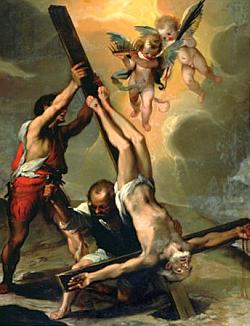At Religion News Service, Jonathan Merritt lays down the smack on rich people—at least the kind of 1%-er depicted in this Cadillac ad:
You can read Merrit’s full rant at “Sochi Cadillac Ad Encourages Worship at the Altar of Work and Stuff.” It’s hard to come away from reading that piece and not think that all rich people are damned.
I think Merritt’s complaint is an extension of the radical discipleship trend.
I used to be one of those people who thought scant numbers of the rich would inhabit the more heavenly portion of the afterlife. At least that’s the way I once read the Bible. (Frankly, we know all the anti-rich verses in the Bible, so I’m not even going to bother putting them here.)
Here’s part of the problem:
There’s no glory in being poor, and all the sociological studies show as much. The poor are by far less happy about life. They struggle more and appreciate the “spiritual benefits” of life’s struggles less. And if anything, “the love of money is the root of all evil” is more of a problem for the poor than the rich. Anyone who has seen a parking lot of a retailer that sells lottery tickets on those days when the government welfare checks arrive knows from the discarded tickets littering the lot’s asphalt that there’s a lot of love of money on display.
Merritt also decries the workaholic lifestyle, but who is the true workaholic when the rich man works 60 hours a week and saves enough money to retire at 50, while the poor man works 40 hours a week and keeps working until he drops dead at 75?
And from what did the attitude in the Caddy commercial originate? The Reformation perhaps? Luther had strong opinions about the sanctity of work, and it was Calvinists who gave us the Protestant Work Ethic concept that now powers much of the mentality on display in that ad.
Here’s the more discombobulating part of the anti-conventional wisdom regarding rich and poor:
In Rodney Stark’s The Triumph of Christianity, the renowned sociologist of religion makes interesting arguments that Jesus was not only not poor, He was likely upper middle class. Stark is no theologian but a sociologist, yet his arguments in favor of his theory are well-reasoned and interesting to ponder.
Even more contrarian is Stark’s less conjectured argument that the early Christian Church was not only bankrolled by the richest members of that era’s society, but the rich were Church members at twice the percentage as their representation in the general population. In short, the Church in Acts was loaded by the organizational standards of the day, and the rich were some of its most prevalent members.
Yet even more upending is Stark’s contention that the rich Church has been the case for almost the entirety of its history. This was true in Rome, where the homes that the traveling evangelists often stayed were on the order of today’s McMansions—or even larger. This was also true in post-Rome Europe, where the poor were almost never Christians (but instead practiced pagan religions) and Christianity was bankrolled and supported by the nobility.
In fact, when Merritt claims that rich people finance today’s megachurches—as if this is some damning statement—in reality, this has always been the case in history.
Stark notes the fledgling Church would not have gotten anywhere and definitely would not have spread as it did without people with a lot of money investing in the work of the Kingdom. Same for the Protestant Reformation. That Luther-led revolt against the RCC would have died early on, since Luther would have been assassinated and his writings unpublished—if not for the German nobility who protected the reformer and funded his writings.
Is it hard for the rich to enter the Kingdom? Sure. But hard does not mean impossible. Stark’s historical research shows as much.
Christians need to be very careful about painting with a broad brush with regard to rich and poor. Many times, the supposed materialist is the one secretly funding a ministry you and I swear is life-changing and godly.


